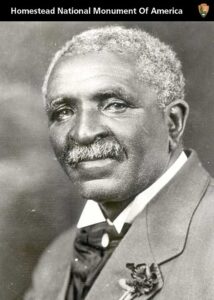George Washington Carver: Innovator in Agriculture and Sustainability
George Washington Carver revolutionized agriculture by developing innovative farming techniques and creating hundreds of products from crops like peanuts, sweet potatoes, and soybeans. His commitment to sustainability, education, and economic empowerment continues to inspire modern agricultural practices.
From Humble Beginnings to Agricultural Pioneer
Carver was born into slavery before its abolition and faced immense challenges as he pursued his education. Determined to expand his knowledge, he left home at a young age and eventually earned a Master of Agriculture from Iowa State University. His groundbreaking research on plant diseases impressed his professors, setting the stage for a career dedicated to agricultural innovation and sustainability.
Advancing Sustainable Farming at Tuskegee
In 1896, Booker T. Washington invited Carver to join Tuskegee Institute (now Tuskegee University) to develop an agricultural program to empower Black farmers. Carver accepted under the condition that the school maintain an all-Black faculty. He remained at Tuskegee for the rest of his life, teaching, researching, and promoting regenerative agriculture.
Carver advocated for crop rotation, soil conservation, and diversification, helping farmers break their dependence on cotton. His methods improved soil health, increased yields, and promoted self-sufficiency—principles central to modern sustainable farming.
The Peanut Man: Transforming Agriculture & Industry
Although Carver is often associated with peanuts, he did not invent peanut butter. Instead, he developed over 300 peanut-based products, including:
✅ Cooking oils and salad dressings
✅ Soaps, cosmetics, and lotions
✅ Paper, dyes, and paints
✅ Medicinal uses like antiseptics and laxatives
His work extended beyond peanuts. He also found over 100 uses for sweet potatoes, creating products such as flour, vinegar, rubber, and writing ink. His research showed how agricultural byproducts could be repurposed into valuable goods, laying the foundation for today’s farm-to-industry sustainability movement.
Carver’s Lasting Impact on Agriculture
🌱 Innovative Agriculture & Sustainability
Carver’s crop rotation techniques and advocacy for alternative crops influence organic and regenerative farming today.
💰 Economic Empowerment
He encouraged small farmers to diversify crops and develop value-added products to increase profits.
🎓 Education & Advocacy
Carver’s work at Tuskegee empowered generations of students and farmers with scientific knowledge and practical skills.
🖤 Cultural & Historical Legacy
His persistence, ingenuity, and impact on sustainable agriculture symbolize resilience and innovation in Black history.
George Washington Carver transformed agriculture by advocating sustainability, economic empowerment, and scientific innovation. His methods remain relevant today as farmers seek solutions for soil health, climate resilience, and resource efficiency. We continue to build a more sustainable and equitable food system.
Reference
https://www.history.com/topics/black-history/george-washington-carver#carver-makes-black-history

